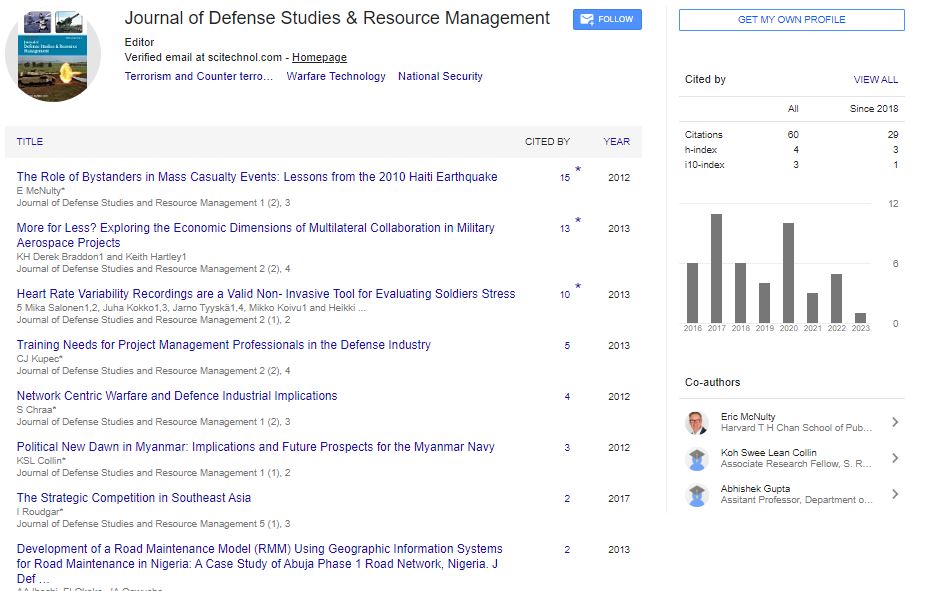Opinion Article, J Def Stud Resour Manage Vol: 11 Issue: 1
Managing Risk and Uncertainty in National Defense Strategies
Maj Thomson*
Department of Information Management, Humboldt University of Berlin, Berlin, Germany
*Corresponding Author: Maj Thomson
Department of Information Management,
Humboldt University of Berlin, Berlin, Germany
E-mail: maj.thom@edu.de
Received date: 28 February, 2023, Manuscript No. JDSRM-23-95537;
Editor assigned date: 03 March, 2023, Pre QC No. JDSRM-23-95537 (PQ);
Reviewed date: 17 March, 2023, QC No. JDSRM-23-95537;
Revised date: 24 March, 2023, Manuscript No. JDSRM-23-95537(R);
Published date: 31 March, 2023, DOI: 10.4172/2324-9315.1000168
Citation: Thomson M (2023) Managing Risk and Uncertainty in National Defense Strategies. J Def Stud Resour Manage 11:1.
Description
Managing risk and uncertainty in national defense strategies is an important component of effective defense planning. National defense strategies must account for a wide range of potential threats, both current and future, and must be designed to respond to a constantly changing global security environment. The task of managing risk and uncertainty in national defense strategies is complex, but it is essential to ensuring the safety and security of the nation.
One of the key challenges in managing risk and uncertainty in national defense strategies is the unpredictable nature of modern warfare. Advances in technology have produced new opportunities for warfare, but they have also made it more difficult to predict the actions of potential adversaries. This unpredictability produces a level of risk and uncertainty that must be managed carefully.
There are several strategies that can be employed to manage risk and uncertainty in national defense planning. One approach is to invest in intelligence gathering and analysis. By gathering as much information as possible about potential threats, defense planners can reduce uncertainty and make more informed decisions. This requires a significant investment in intelligence resources, but it can pay off in the long run by helping to identify and mitigate potential threats before they can cause significant harm.
Another strategy for managing risk and uncertainty is to adopt a flexible approach to defense planning. This involves developing a range of response options that can be adapted to changing circumstances. By building flexibility into defense plans, planners can respond quickly to unexpected events and adjust their strategies as needed. This can be particularly effective in situations where uncertainty is high and the situation on the ground is rapidly changing.
A third strategy for managing risk and uncertainty in national defense planning is to prioritize investments in important infrastructure. This includes investing in the development of robust and resilient communication networks, transportation systems, and energy resources. By prioritizing investments in important infrastructure, defense planners can reduce the impact of potential disruptions and ensure that essential resources are available when needed.
A final strategy for managing risk and uncertainty in national defense planning is to prioritize investments in research and development. By investing in the development of new technologies and capabilities, defense planners can stay ahead of potential adversaries and reduce the level of uncertainty in defense planning. This can include investments in areas such as cybersecurity, artificial intelligence, and unmanned systems.
In addition to these strategies, there are several best practices that can help to manage risk and uncertainty in national defense planning. These include developing contingency plans for a range of potential scenarios, regularly reviewing and updating defense plans in response to new information, and fostering collaboration and information sharing among different branches of the military and between military and civilian organizations.
Ultimately, managing risk and uncertainty in national defense planning is a complex task that requires careful attention to a wide range of factors. It requires a significant investment of resources, both financial and human, and must be approached with a high degree of flexibility and adaptability. By employing a range of strategies and best practices, defense planners can reduce uncertainty and ensure that national defense strategies are effective in responding to the everchanging global security environment.
 Spanish
Spanish  Chinese
Chinese  Russian
Russian  German
German  French
French  Japanese
Japanese  Portuguese
Portuguese  Hindi
Hindi 